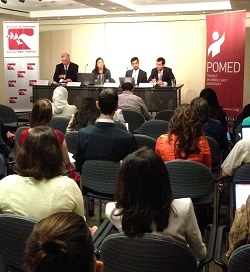On 5 June, Americans for Democracy and Human Rights in Bahrain (ADHRB) and the Project on Middle East Democracy (POMED) hosted an event at teh Carnegie Endowment for International Peace to discuss the upcoming elections in Bahrain. The event included: Matar Ibrahim Matar, former Member of Parliament in the National Assembly of Bahrain; Les Campbell, Middle East and North Africa Director at the National Democratic Institute; Dr. Dafna Rand, Deputy Director of Studies & Leon E. Panetta Fellow at the Center for a New American Security; and Stephen McInerney, Executive Director at POMED, as moderator.
Moderator Stephen McInerney began by describing the “continuous, but uneven, deterioration” of the political situation in Bahrain and noted that there is currently no set date for elections this year and no serious political participation by the opposition.
Matar Matar provided an overview of the situation in Bahrain from 2011 until present day, noting that there has not been any positive change on the ground since then. Matar mentioned that the opposition participated willingly when the Crown Prince called for a meeting, yet no concessions were offered to the opposition. As Matar sees it, the “government is shutting doors to any participation from the opposition”. He stated that Al-Wefaq is ready to participate if there is an inclusive process, with a roadmap for reform; inclusive meaning the leaders who are in prison as well. According to Nabeel Rajab who was recently released, even those who are in prison are looking for a solution that includes dialogue.
Matar concluded his remarks with a summary of how seriously Bahrain’s situation is deteriorating. The national debt is out of control and will become unmanageable by 2017. Terrorism could become a real concern as reports of Bahraini joining al-Qaeda in Syria increase.
Dr. Dafna Rand, a former member of the Obama administration who served on the National Security Council, tried to answer a few key questions: How much skin in the game do US official want to spend to get involved in the Bahrain election? How can we encourage the Administration to get to “yes” on the question of getting involved? Dr. Rand believes that there are many good reasons to get involved now, and it is worth the time and resources to do so. One strong reason is that time is not on anyone’s side, as evidenced by the escalation and radicalization of certain groups. Dr. Rand did make it clear that sectarianism has been “manufactured from the top”, and is not inherent to the fabric of the region as some may argue.
Dr. Rand argued that the U.S. government should use positive leverage as opposed to negative leverage, such as threatening the withdrawal of the Fifth Fleet or other punitive measures, to encourage reform in Bahrain. She noted that a part of this is empowering senior officials throughout the administration to work towards reform for Bahrain. A positive step in this direction, Dr. Rand noted, is that senior officials at the Pentagon talk about the BICI and have peacebuilding and human rights knowledge. When asked about why the U.S. hasn’t taken a stronger role in Bahrain, Dr. Rand explained that there is a “big, philosophical debate about how involved the U.S. should be in the Arab Spring. One possible form of engagement is for designees, one from State and one from Pentagon to join up on Bahrain and present strategies. They shouldn’t dictate terms because that is not the U.S.’s place, but they should reassure both sides that they will have their backs.”
Les Campbell cautioned that many of the actions opposition groups have been asked to do during this election have been tried before, in 2002 for example. Even then constituencies within Bahrain were horribly gerrymandered. Meanwhile, Ali Salman participated in international discussions back in 2002 as a moderate Shia voice, yet such opposition engagement was eventually stamped out by the Bahraini government. When MPs began to become more effective, with pension reform and land reform, the government shut them down very quickly.
Campbell pointed out that when the Bahrain Institute for Political Development was established and laws were passed preventing any foreign entity from speaking or meeting with a Bahraini person without approval from them, the international community shrugged it off. This led to the decline in international civil society programs in Bahrain, as it prevented even senior MPs from meeting with outside groups. Ebrahim Sharif did ignore that law to meet with NDI and there is reason to believe that this contributed to his detention.
Though Campbell is highly skeptical and cynical about Bahrain, he proposed that the international community can push for fair elections. He also pointed out that one positive outcome of the past 10 years is an increased cohesiveness in purpose within the opposition. Moderate opposition should consider participating in the elections even though the Bahrain government rejects any kind of conciliation. Ultimately, everyone wants to avoid the situation of “building pressure until it explodes”.





